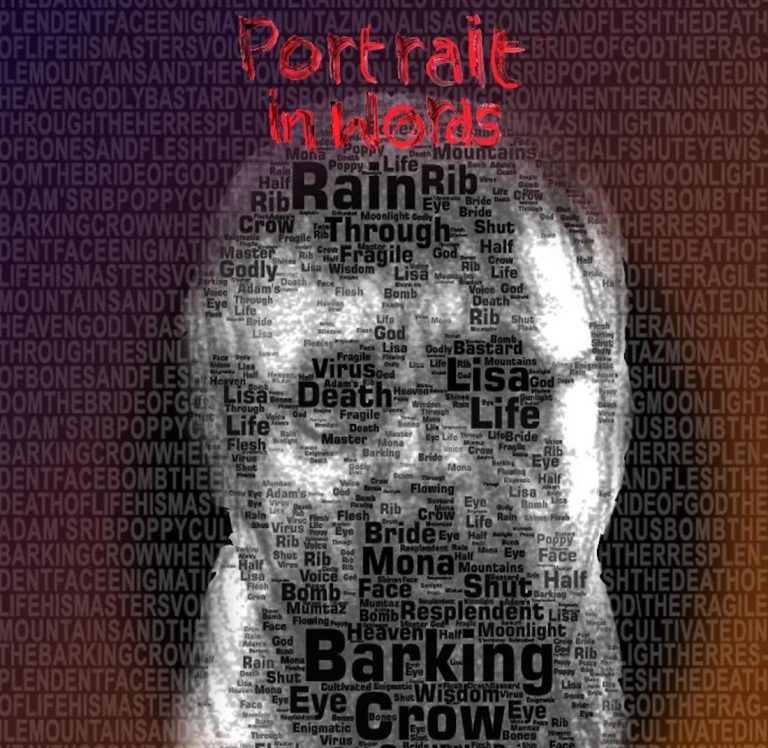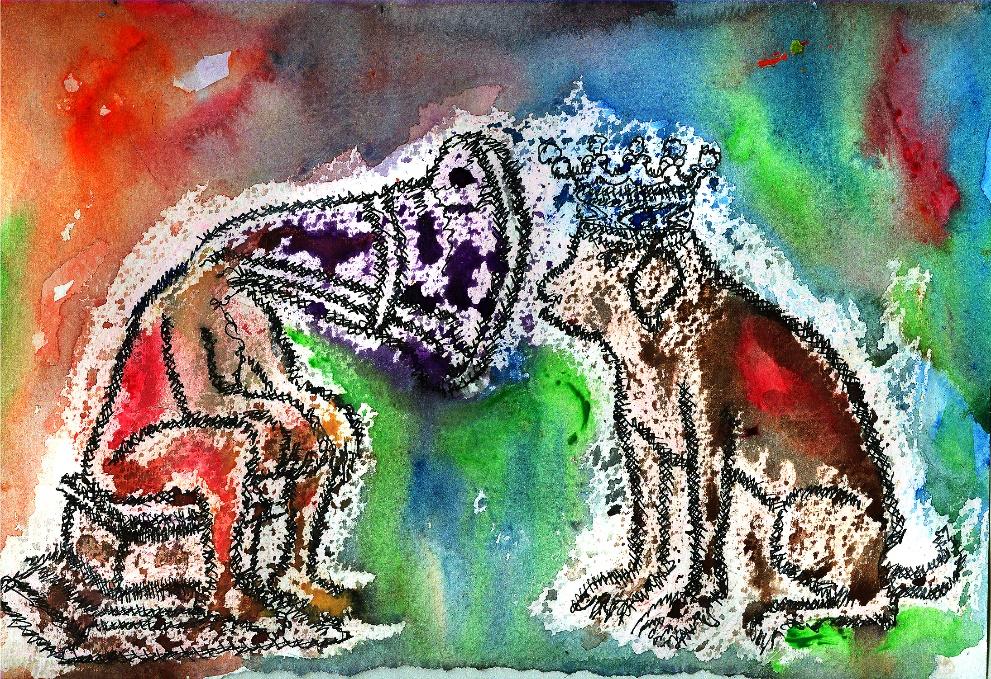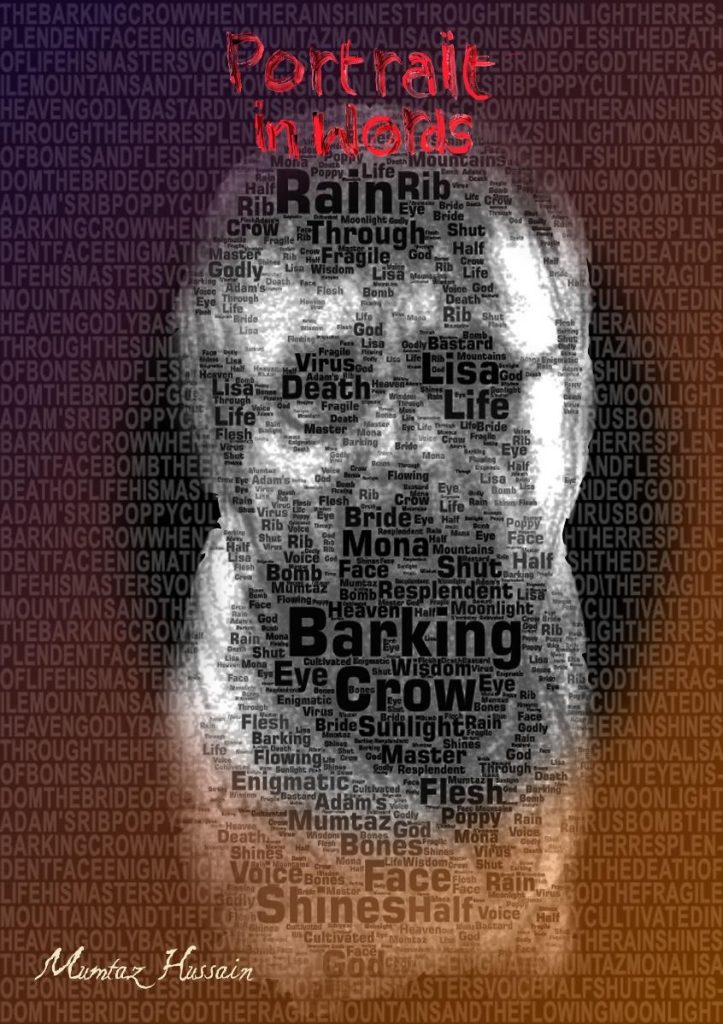
Portrait in Words | Mumtaz Hussain
The Alphabet of the Image | Mumtaz Hussain’s short stories with paintings

“You are a swing, and I am its shadow; I wish to fly with you.”
When Jawaid saw the record for sale in the antique store, all his scattered childhood memories were glued back together like pieces of shattered glass. He picked up the extended play record, dusted it off, and pulled it from its cardboard sleeve. It was 50 years old but had not a single scratch. It was shiny and black, like the long hair of a beautiful woman pulled up into a bun. A red circular label sat in the center of the shining plastic. A white dog sitting on the wrapper seemed gratified by the sound pouring out of the gramophone horn.
When Jawaid spun the record on the tip of his middle finger, the dog also rotated. The rotation of the record started awakening some melodious sounds sleeping in Jawaid’s mind. His slumbering memories returned, much like his mother’s morning song. He then gazed upon his blurry reflection in a mirror of lost memories. He vividly saw his misty reflection in those lost memories. He immediately put the record back into its sleeve, paid the asking price without haggling, and promptly left the shop. He felt as if he had found a thing of significant monetary value. In days to come, he would occasionally pick up the cardboard sleeve and pull out the shining black record, looking at it with remorse as if it when a small packet of tender memories. He waited with impatience for the day to come when he could hear its music. One day he would listen to the song and embrace the memories of his mother as his mother used to embrace him.
During the day, he studied pharmaceuticals and worked in the Nadim Medical Hall at night. He heard the song several times on stereos, but clear sounds couldn’t bring him back to his mother. A gramophone’s winding handle, its beak holding the needle, produced the background hum needed to connect him.
Whenever he was relieved of his duties at the Nadim Medical Hall, he would visit Hall Road electronic shops, where new-style stereos were available. Under the pretext of purchasing a machine, he would play his songs repeatedly. But the polished tunes never created the same imperfect scratch of the gramophone’s needle that triggered those rich memories.
And, anyway, he didn’t have enough money to purchase a stereo, so he always carefully brought back his record, housed in its sleeve, like a bag of memories after listening to it in the stores. When the last days of his pharmacy studies approached, Jawaid’s teacher informed him that American Visas were being distributed to those interested in working for pharmaceutical companies abroad. Jawaid prepared himself to find the light of his future in a foreign land.
Upon reaching the U.S. Jawaid was offered an apprenticeship in a big pharmaceutical company with several stores spread throughout the country. He entered a new world filled with new ways. Fortunately, he was an educated man not unfamiliar with the language of this land. He brought his luggage along with the bundle of his memories. This meant he brought that record with him. He hoped that one day he would find that gramophone with that worn-out sound that would connect him again to the memories of his mother.
It just so happened that Jawaid frequently passed by the office of the company’s president. The man’s name and title were inscribed on the door as president, with the vice president’s name below. The president was always seen leaving his office in the company of a dog. But Jawaid never saw the vice president, even though he looked.
One day, Jawaid asked a colleague about the vice president’s whereabouts. After getting the answer, he fell under a spell of amazement and anger. He could not understand how the honorary vice-president of the company could be the dog itself, which always walked elegantly with his master the way King Akbar walked with his son Prince Salem. As soon as the master would stop, the dog would stop. As they walked, Jawaid’s anger moved along with them.
Jawaid considered this a disgrace to the entire human race. “Cursed be this life in which I have to serve dogs.” Jawiad consoled himself. “All bosses are dogs anyway.” He developed a hatred for dogs. “What type of dogs are these? And why don’t they die?” According to Mushtaq Ahmad Yusufi, the dogs were created for the sole purpose of permitting the existence of art, as so beautifully articulated by the great Pakistani essayist Pitris Bukhari or witnessed in the Italian film Umberto D.
“What a shame that bosses are always loathsome, and on top of it, mine is a dog?” Jawaid’s agony was similar to that of the President’s wife. She also cherished hate for this dog. Perhaps the president had more love for the dog than his better half, especially since the dog was also a company shareholder. Or maybe she was after the office of vice president herself. Jawiad and the president’s wife bonded in a way Karl Marx explained by the line, “If the destination is the same, the understanding is one.”
The shared hatred for the dog brought Jawaid closer to the president’s wife. The boss’s wife always cursed the dog. Additionally, Jawaid hated the dog from the viewpoint of culture and religion since dogs are considered contrary to a clean and holy household. If a dog is within a home, angels never say prayers for the inhabitants but rather from at least five blocks away.
If a rabid dog bites a human, he suffers from the pain worse. Looking at the color blue, the only way to eradicate the pain leads to death; if the medical aid is available on time, the poor individual still has to endure 14 injections in his abdomen. If a dog bites a dirty pig, two horns will emerge from the swine’s forehead, and a pointed red tail will emerge from its hind side.
As time passed, the bitter poison of the shared hatred between Jawaid and the president’s wife evolved into the sweet honey of friendship, resulting in promotions for Jawaid. The sectors that he was managing became more financially successful. And in turn, he became more prosperous.
While dusting away the poverty of his past, he also dusted his beloved record. He started tightening his pants belt like he was tightening lost memories. He began to visit gramophone stores on Fifth Avenue in New York. But no store had a machine that could produce those circles dancing on the record or bring back memories like the circular ripples surrounding a stone thrown into standing water.
But he didn’t lose heart and continued his efforts.
Inna Lillaha wa Inna Ilaihi Raji’oon
“We are for Allah, and we are to return to Him.”
One day, the president of the company passed away. The entire company observed this black day and grieved, including the dog who lost his title. The president’s wife kept the dog for a few days and endured his presence but developed such vigorous sneezing that she had to consult a doctor. It was advised that she had allergies to the dog and needed to get rid of him as the only prescription for relief. The president’s wife then asked Jawaid to arrange for the dog’s removal; subsequently, the three of them left for a slaughterhouse. This was where owners of unwanted dogs and cats brought their pets so they could be put to sleep with lethal injections. As they passed the antique shops on Broadway near 29th Street, the dog would repeatedly look toward the stores and bark. As Jawaid turned to look at their showcases decorated with gramophones, a memory was sparked like the scratch of a matchstick.
After they arrived at the slaughterhouse, Jawaid and the president’s wife completed the necessary paperwork. As Jawaid strengthened his grip on the dog’s leash, the dog raised his sorrowful eyes as if he knew that his death warrant had been stamped. Despite this, he wagged his tail. And when the slaughterhouse attendant called them, the dog again appealed to Jawaid with a helpless and pleading expression. A faint scream came from the dog’s throat with an “Oooon” as he went inside. And after a while, his limp, lifeless body was handed over to the president’s wife for her to bury.
But the dog lit a spark of memory in Jawaid, which could not be put out and blazed up in his mind. The next day, he went to the antique shops and asked about a certain gramophone they had. He learned that it was 100 years old and still working. A key-rotating handle and sound-box needles come with it. With anxious excitement, Jawaid bought it and rushed home to give it a suitable home. He placed it on the floor, put the speaker in a hole on the right side, moved the key with the small handle to build up the required energy, and bent the sound box’s head by moving its neck and placing a new needle in the beak. He fetched the record from its sleeve and wiped it clean with his shirt.
He anxiously placed the record around the fat nail protruding from the middle of the gramophone and put the needle on the record. He hurriedly sat in front of the speaker, longing to melt every word of his memories in his ears. He wished to store these words in his soul. And when he gazed upon the record, he noticed the picture of the small dog on the red label. It was as if the dog sat with him before the gramophone. It looked exactly as if he had been sitting in front of the gramophone in the form of a dog, and at once, the sight of the dead dog started to revolve in his mind like the spinning record.
He raised his hand and accidentally touched the gramophone head with his hand, making a scratch sound precisely like the dog’s “Ooon” uttered just before his death. The round, red label on the record caught Jawaid’s attention of had the inscription,
“HIS MASTER’S VOICE.”

Portrait in Words | Mumtaz Hussain
The Alphabet of the Image |
Mumtaz Hussain’s short stories with paintings
- Chapter 1 | The Barking Crow
- Chapter 2 | When the Rain Shines through the Sunlight
- Chapter 3 | Her Resplendent Face
- Chapter 4 | Enigmatic Mumtaz
- Chapter 5 | Mona Lisa of Bones and Flesh
- Chapter 6 | The Death of Life
- Chapter 7 | His Master’s Voice
- Chapter 8 | Half Shut Eye Wisdom
- Chapter 9 | The Bride of God
- Chapter 10 | The Fragile Mountains and the Flowing Moonlight
- Chapter 11 | Adam’s Rib
- Chapter 12 | Godly Bastard
- Chapter 13 | Poppy cultivated in Heaven
- Chapter 14 | Virus Bomb
See:
Pakistani Mumtaz Hussain Bags 2024 International Impact Book Award (April 23, 2024)
Historic Win for Pakistani-American at International Impact Book Awards (April 13, 2024)
